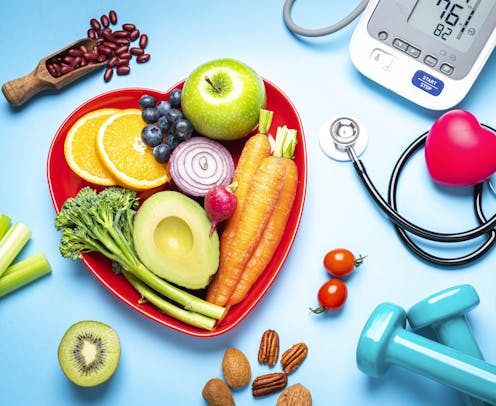Prescriptions for fruits and vegetables can improve the health of people with diabetes and other ailments, new study finds
- Written by Kurt Hager, Instructor of Epidemiology, UMass Chan Medical School

The health of people with diabetes, hypertension and obesity improved when they could get free fruits and vegetables with a prescription from their doctors and other health professionals.
We found that these patients’ blood sugar levels, blood pressure and weight improved[1] in our new study published in Circulation: Cardiovascular Quality and Outcomes.
The improvements we saw in clinical outcomes could have a meaningful impact on overall health. For example, systolic blood pressure, or blood pressure during heartbeats, decreased more than 8 millimeters of mercury, or mm Hg, while diastolic blood pressure, or blood pressure between heartbeats, decreased nearly 5 mm Hg. For context, this is about half the drop gained through medications that lower blood pressure[2].
Many U.S. health care providers have been experimenting with “food is medicine[3]” programs, which provide free, healthy food to patients – sometimes for a year or more.
This is the largest analysis to date of produce prescription programs, which are one variety of these efforts. They let patients with diet-related illnesses get apples, broccoli, berries, cucumbers and other kinds of fruits and vegetables for free. In Los Angeles, Boise, Houston, Minneapolis and other places where the programs we studied were located, participants selected the produce of their choice at grocery stores or farmers markets using electronic cards or vouchers. They typically received about US$65 per month for four to 10 months.
We pooled data from 22 U.S. produce prescription locations operated by Wholesome Wave[4], a nonprofit that promotes access to affordable, healthy food. None of the pilots had previously been evaluated. All 4,000 participants either had, or were at risk for, poor cardiometabolic health and were recruited from clinics serving low-income neighborhoods.
Participants in these programs ate more fruits and vegetables. They were also one-third less likely to experience food insecurity[5] – not having enough food to meet basic needs and lead a healthy life.
Wholesome Wave’s Fruit & Vegetable Prescription Program explained.Why it matters
More than 300,000 Americans die annually of cardiovascular disease and diabetes[6] cases tied to what they eat.
The people in the estimated 13.5 million U.S. households[7] experiencing food insecurity are more likely than others to have cardiometabolic health problems[8], such as diabetes or heart disease. They also have shorter life expectancy[9] and higher medical costs[10].
Most Americans, regardless of their income, don’t follow a healthy diet[11]. However, research shows that lower-income Americans tend to eat food[12] that’s slightly worse for their health than those who can afford to spend more.
The 2022 White House Conference on Hunger, Nutrition and Health[13] brought together experts who outlined a national strategy to eradicate food insecurity and reduce diet-related illnesses. It ended with a strategy calling for[14], among other things, more produce prescription programs.
The last White House conference on hunger and nutrition, which occurred over 50 years earlier, led to significant and lasting changes in U.S. food policies[15]. The National School Lunch Program expanded and the Special Supplemental Nutrition Program for Women, Infants and Children[16], known as WIC, was created.
Within a year of the latest conference, two government agencies – the Indian Health Service[17] and the Veterans Health Administration[18] – announced produce prescription pilots. Eight state Medicaid programs have received or applied for federal waivers[19] that would allow Medicaid to pay for produce prescriptions for up to six months[20] for some people. However, these programs remain unavailable to most Americans who might benefit.
Dariush Mozaffarian of Tufts University discusses ‘food is medicine’ initiatives.What’s next
We are evaluating “food is medicine” pilots funded by the Flexible Services Program[21] in Massachusetts’ Medicaid program. We are also running a large, randomized controlled trial, in which one group of patients with cancer will get free home-delivered meals and another will receive standard care.
The Research Brief[22] is a short take on interesting academic work.
References
- ^ blood sugar levels, blood pressure and weight improved (doi.org)
- ^ gained through medications that lower blood pressure (doi.org)
- ^ food is medicine (doi.org)
- ^ Wholesome Wave (www.wholesomewave.org)
- ^ experience food insecurity (theconversation.com)
- ^ die annually of cardiovascular disease and diabetes (doi.org)
- ^ 13.5 million U.S. households (www.ers.usda.gov)
- ^ cardiometabolic health problems (doi.org)
- ^ shorter life expectancy (doi.org)
- ^ higher medical costs (www.ncbi.nlm.nih.gov)
- ^ don’t follow a healthy diet (doi.org)
- ^ lower-income Americans tend to eat food (doi.org)
- ^ 2022 White House Conference on Hunger, Nutrition and Health (health.gov)
- ^ ended with a strategy calling for (www.whitehouse.gov)
- ^ led to significant and lasting changes in U.S. food policies (doi.org)
- ^ Special Supplemental Nutrition Program for Women, Infants and Children (www.fns.usda.gov)
- ^ Indian Health Service (www.hhs.gov)
- ^ Veterans Health Administration (www.va.gov)
- ^ received or applied for federal waivers (www.axios.com)
- ^ for up to six months (www.statnews.com)
- ^ Flexible Services Program (www.mass.gov)
- ^ Research Brief (theconversation.com)







